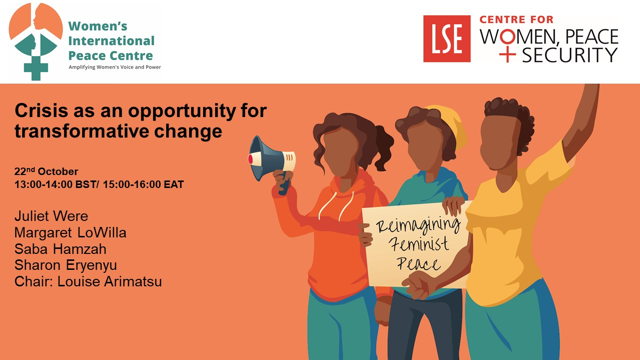The Peace Centre launched their 2nd Edition of The Feminist Peace Series Magazine in a virtual event co-hosted by the LSE Centre for Women Peace and Security on 22nd October 2021. The Feminist Peace Series was born out of the continuous inquiry into what Feminist Peace means in practice intending to showcase the different transformative approaches to peacebuilding.
The 2nd edition focuses on how women and, in particular, feminist peace activists are responding to the direct and indirect consequences of COVID-19 and elaborate on the practical and theoretical implications for feminist peace. Each of the authors was invited to reflect on the implications of the global pandemic – grounded in the local and personal – and framed by their conceptions of feminist peace. To that extent, this collection opens up new epistemological, political, and intellectual possibilities enriching feminist knowledge. That the reflections shared also echo so much of what has been observed by fellow feminists in other spaces, is hardly surprising.
Speakers included Margaret LoWilla, a researcher and writer, Saba Hamzah a Yemeni poet, writer, and educator, Sharon Eryenyu an African Feminist and Content Creator with the discussion moderated by Dr. Louise Arimatsu. The discussions focused on how women and, in particular, feminist peace activists are responding to the direct and indirect consequences of COVID-19. While many have suggested that COVID19 has been an equalizer. But depending on gender, social status and geographical location, the pandemic has had dire consequences that included loss of livelihoods, increased care work, increased violence and increased resistance.
Margret discussed how COVID19 reflects and exposes the shortcomings of patriarchal and neoliberal forms of governance, leadership and approaches to peace and security. COVID-19 thrives on hierarchies and their interconnections globally and locally – She emphasized the need for a new start, new ways of thinking, new imaginations of collectively. Sharon shared more about her article where she discussed the current situation in Uganda and the measures that must be introduced to ensure full COVID19 recovery moving forward – Sharon critiqued Uganda’s response to the COVID19 pandemic which involved establishing task forces that didn’t include women, especially at district level. She recommend that women must be included in crisis response & given the opportunity to lead, in all their diversities and refrain from use of warlike language to describe its response to the pandemic is problematic. It indicates that as a nation we think the best way to handle the situation is to cause fear and panic among the citizens
The central argument to this series is that all crisis and recovery processes should be gender responsive, with women involved from the very beginning. The COVID-19 pandemic will no doubt have long-lasting effects on the struggle for Feminist Peace and gender equality for women and girls worldwide. We need to prioritize a feminist strategy, support women’s movements, and bring women’s voices and leadership to the forefront. The COVID19 crisis is an opportunity to re-imagine and re-create our societies towards feminist peace. Real progress will require the rejection of unequal hierarchical distributions of power and the re-centring of care work and human security.
With Feminist Peace Series, we hope to continue building a community of diverse contributors and readers that value activism and that understand feminist perspectives on peacebuilding.



